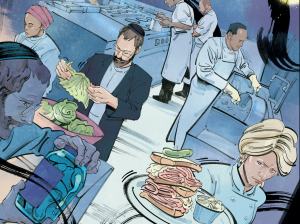Joseph Rucker had planned to be at Camp Ramah, a Jewish summer camp in Muskoka, Ont., by June 19, guiding young campers through leadership programs he’s been eagerly anticipating all year. Instead, he’s stuck in Israel, grounded amid cancelled flights and escalating uncertainty as conflict continues to grip the region.
“The (counsellor in training) kids I’ll be working with this summer—this is easily the most exciting summer for them,” said Rucker, a third-year staff member at Ramah. “To be able to facilitate that program for these kids is extremely important to me, and I have been looking forward to doing it this summer.”
Rucker, who is currently in Israel participating in the Forum for Jewish Leadership—a program affiliated with Birthright Onward that emphasizes Jewish education, Shabbat experiences, and guest speakers—is among thousands of Israelis and Canadians trapped as commercial air travel stopped in response to the ongoing war and recent escalations between Iran and Israel.
The cancellations are straining Canadian Jewish summer camps, many of which rely heavily on Israeli staff and Canadians currently overseas.
“There’s definitely the sentiment that people are motivated to continue on with what they plan to do, but they’re definitely nervous about the logistics,” Rucker told The Canadian Jewish News.
Meir Balofsky, a Canadian who lives in Israel and is staff training coordinator at Camp Moshava Canada, near Peterborough, Ont., said roughly one-third of the camp’s staff, including most senior leaders (including him), are stuck in Israel. The disruption affects Israelis, gap-year students, and Israeli high schoolers whose graduation exams have been delayed, he explained.
“Ever since they closed the skies, not only is it not happening and not only have the flights all been canceled, but there’s no real sense of when that’s going to resume,” Balofsky said. “Whenever they do open up commercial flights, it’ll be like an absolute mad rush to try and get tickets. Right now professionally, it’s crazy because I’m staying here and there’s a whole bunch of students who have commitments to go to summer camps, who now can’t leave.”
Balofsky added that the financial implications and logistical uncertainties are significant, especially for younger camp staff whose modest earnings from summer camp jobs often barely cover their flight expenses, making the prospect of costly, last-minute flights especially challenging.
He also mentioned the gravitational pull of summer camp during moments of turmoil, describing it as a “closed, utopia of sorts,” emphasizing camp’s unique ability to provide a meaningful escape from conflict and stress, a space where people can “be part of a community, and be their authentic self.”
He added that people stuck in Israel “don’t know what to expect, or what the timeline (for leaving) is going to be.”
At Camp Kadimah in Nova Scotia, director Sarah Atkins is similarly navigating uncertainty. Approximately 30 staff members — some Israelis, some Canadians — are currently in Israel. Despite logistical challenges, Atkins remains hopeful.
“Certainly, if they miss training, we will do our best to get them caught up when they get to camp,” she said. “If we have to fill their positions by other people volunteering until they get there, then we will do that.”
Atkins emphasized the importance of camp as a haven, saying, “The foundation of the camp is Jewish values and fun—a combination that’s separate from conflict. Everybody is looking forward to getting back to that place they love.
“I think everyone is looking forward to getting back to that after conflict on campus and for some of them, conflict in Israel.”
Kyle Goldenberg, a Canadian staff member for Kadimah, currently in Israel, describes nights filled with sirens and shelter runs. Despite the stress, he is optimistic he’ll eventually reach camp, emphasizing its significance during turbulent times.
“I’ve grown up going to Kadimah all my life since I was eight years old,” Goldenberg said. “Israel and Kadimah—they’re very intertwined. This is going to be very impactful depending on when the airspace and everything reopens.”
Goldenberg shared his firsthand experiences of the crisis: “We heard missiles landing nearby and impacts on buildings—it was really frightening. But once we’re in the shelter, everything’s fine. It’s more about the logistics of getting home.”
Camp Ramah, meanwhile, issued an email reassuring families that, despite cancellations, camp will proceed as scheduled on June 25.
“We are adjusting staffing plans and programming to make sure that your children will still enjoy a full and meaningful camp experience,” wrote the camp.
“While there may be slight changes being made behind the scenes, we are committed to minimizing disruptions and maintaining the magic, ruach, (spirit) and richness of the Ramah experience.”
At Camp Northland, in Haliburton, Ont., director Simon Wolle says the camp was expecting about 25 staff and campers, a combination of Israelis and local Canadian families who were travelling at the time the airspace was closed over Israel.
“Camp directors always find a way to navigate uncertainty and this will be no exception,” Wolle wrote in an email to The CJN.
“In fact, several of us (camp directors) have already been in discussions around boat and plane charter options, consolidating efforts with programs like Birthright and Onward, and finding ways to creatively and collaboratively maximize the number of people we can collectively help get over to our respective camps.
“We are also thinking about Israelis that were just visiting in Canada that are now uncertain about how and when they can get home. They too are our family. We (Camp Northland) have also extended our hand to these travellers to offer accommodations and food where we have been able to assist. “
For those like Rucker, summer camp represents not only a cherished tradition but a critical respite from the conflict.
“I’m really hoping that I’ll be able to get back before the kids make it there,” Rucker said.
With flights grounded indefinitely, however, many Israeli and Canadian camp staff remain caught in limbo, waiting anxiously for summer skies to clear.
Author

Mitch is The CJN's campus and education reporter based in Toronto, Ont. He has a passion for investigative research, long-form feature writing and digital journalism. His book, Home Safe, was published by Dundurn Press in November 2022.
View all posts








